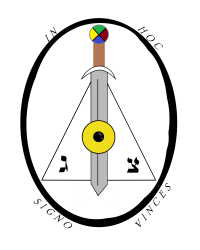Home / What is Thelemic Spiritism? / On Religion / Joy / Health & Safety / Methodology / Community / 'Spooky' Behaviours / Advancement / Book Recommendations
Thelemic Spiritism can be split into Theory and Practice, the former being the philosophical foundations and symbol set, and the latter what we actually do to have the desired effect upon our lives. As both are found elswhere on the site, we will here give the explanation of the term as it is in the Newcomer infosheet:
"The term ‘Thelemic Spiritism’ is a bit tongue-in-cheek (on both fronts); while the work of ‘Uncle Al’ Crowley is informative, it is in no way prescribed nor uncritically endorsed. He had plenty worthwhile to say, and Thelema is the foundation upon which this system is built, but he was also Human, All Too Human; and fell short in many areas (as may be expected from an Edwardian Aristocrat). Moreso on the ‘Spiritism’ aspect, as it bears little to no resemblance to the late 19th century fad. Rather, it is the working with a set of symbols personified as ‘Spirits’, drawing heavily from the Thelemic tradition (as previously intimated).
"The one thing to tend to now, which will not be done later, is more fully explicate this ‘Thelemic’ foundation. Thelema comes from the Greek word for Will. In this context Will, more specifically True Will, can be thought of as the implicit trajectory of your authentic nature (and Crowley is quick to clarify, in Book 4 if memory serves, this does not give a pass to antisocial behaviour - to live as ourselves we must coexist with others). You have certain aptitudes and inclinations which, embraced, produce a particular pattern of behaviour and skill-set. A talented artist is not born so, but constituted in such a way that getting the experience to become ‘talented’ is second-nature; if you know a professional artist, odds are they drew compulsively as a child and still doodle absentmindedly. The phrase ‘Do What Thou Wilt’ is not a call for hedonistic abandon, despite what Crowley’s own life might suggest, but to tend to your duty as a unique individual. It must be stressed again: this is reductive, simply enough to get the core message across.
"Furthermore, there is an undercurrent (obvious to those ‘in-the-know’) of influence from Thelemic philosophy. For example, The Book of Thoth has been and remains a handy reference. But, again, these works are useful for depth, yet an understanding may be achieved without them. Likewise, it is not the only philosophical tradition (obvious to those who read §I.ii) which has had an impact, and often enough it is a case of cross-pollination. More could be said on this topic, but not without attempting to summarise Crowley’s oeuvre, therefore we must pass over it in silence."
Our documents have been collected here in print form.

Made With The Approval Of The I.O.